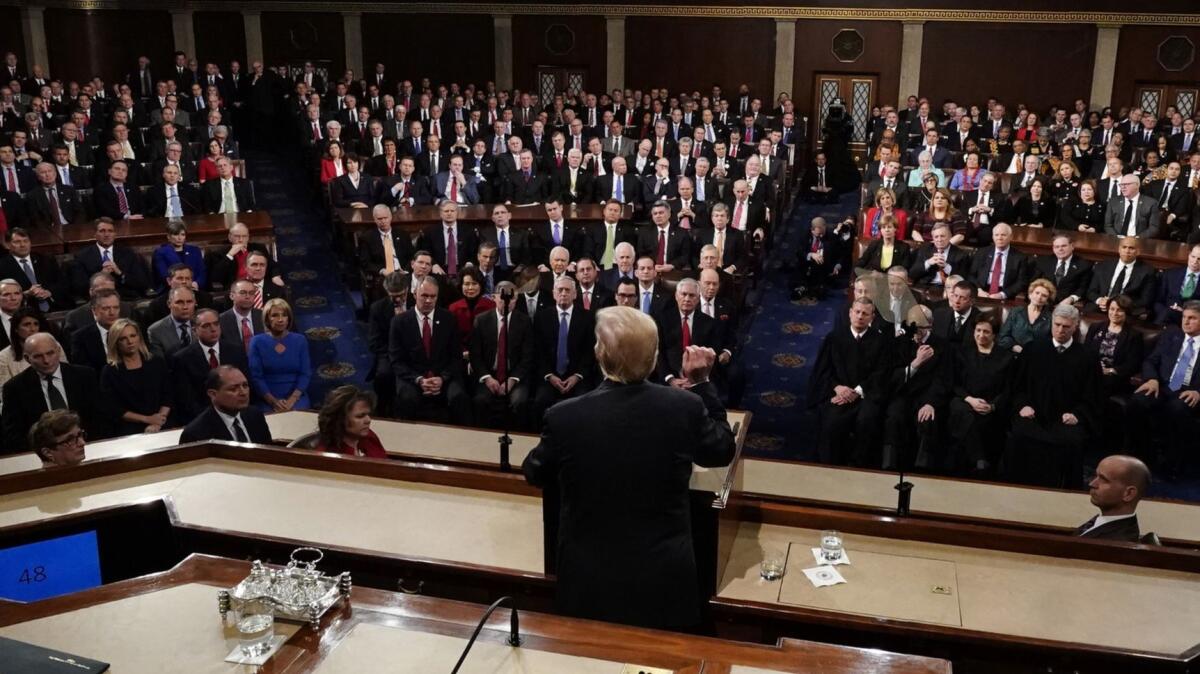Column: Trump’s State of the Union speech: Do not adjust your TV set

- Share via
Reporting from Washington — Cynics often dismiss the annual State of the Union speech as a useless ritual. They’re wrong.
The words, to be sure, are usually forgettable. But the event itself — the pomp-filled spectacle, the partisan applause and the equally partisan silences, unscripted reactions by Supreme Court justices and members of Congress — is always worth seeing.
And on Tuesday, when President Trump addresses a joint session of Congress and the nation from the well of the House, his tone will be especially important because he is undergoing a new experience: a divided government, with the Democratic-controlled House of Representatives led by Speaker Nancy Pelosi.
Pelosi will stand behind the president wielding a gavel and the satisfaction of having bested him in a brutal 35-day standoff over a government shutdown. That alone will be worth a look.
Will he even acknowledge his party’s loss of 40 House seats in November, the worst defeat since Watergate?
After that kind of defeat, most presidents offer at least a show of humility. George W. Bush did in 2007 when he saluted Pelosi’s election as the first female speaker. Barack Obama did in 2011 when he ruefully acknowledged the electorate’s rebuke.
Trump never admits defeat. He still insists the GOP won last year’s campaign, just as he claims he didn’t surrender in the shutdown fight. Aides say he might say something nice about Pelosi, though.
So will Trump be gracious or angry? Inspiring or petty? Conciliatory or confrontational?
Spoiler alert: He’ll probably sound surprisingly little like the irascible, self-absorbed president who fires off insults and tirades in serial tweets. He’ll be teleprompter Trump, not Twitter Trump.
A strange thing happens to Trump at State of the Union time: for one night, one big speech, he abandons his usual bare-knuckled style and summons the better angels of his speechwriters’ nature.
Last year, Trump assured Congress that nothing but blue skies lay ahead — a “New American Moment,” in his unmemorable catchphrase.
It was also true in his 2017 congressional address, when his appeal to patriotism prompted a CNN pundit to declare that “he became president of the United States in that moment.”
And it will be true this time too, if you believe the president and his aides. The theme, Trump told reporters, will be “unity.” A White House aide read a bit of an early draft: “Together we can break decades of political stalemate … bridge old divisions [and] heal old wounds.”
Given the raw edges of American politics since roughly 1968, that would be something to see. Somehow Trump seems a uniquely unlikely vessel for bridging divides and national reconciliation.
But here’s an unsentimental explanation for the president’s once-a-year excursions into rhetorical conciliation and bipartisanship. It’s not the majesty of the moment. It’s smart political strategy.
“There’s broad concern among voters about the level of divisiveness in the country,” Republican pollster David Winston told me.
“If you listen to voters in the middle, both sides came out of the shutdown badly,” he added. “The State of the Union is an opportunity for the president to address that concern and define what matters.”
In that sense, the speech will help Trump kick off his 2020 reelection campaign.
In addition to the feel-good stuff about unicorns and unity, he will crow about strong job numbers and other upbeat economic statistics. He will claim he revived manufacturing jobs in the Rust Belt states that sealed his election in 2016 and could determine the next race. Any president would do the same.
He will also follow tradition and tick off a laundry list of proposals he wants Congress to pass.
They will include money for a southern border wall, tougher immigration laws, money to rebuild crumbling bridges and other critical infrastructure, a law to reform drug pricing, and more.
But those priorities were all on Trump’s list last year when Republicans controlled both houses of Congress — and none of them passed.
With the race to replace Trump already heating up, Democrats — and the president too, for that matter — have little incentive to make big compromises. Thus his bows toward bipartisanship will be even more symbolic than usual.
So when Trump speaks, the television networks might consider running a message on the screen: “Do not adjust your set. The president will return to regular programming soon.”
More to Read
Get the L.A. Times Politics newsletter
Deeply reported insights into legislation, politics and policy from Sacramento, Washington and beyond. In your inbox twice per week.
You may occasionally receive promotional content from the Los Angeles Times.











